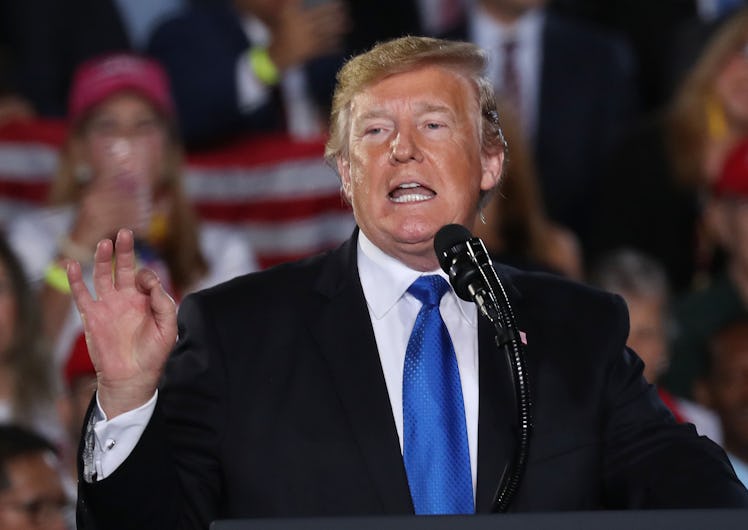
Donald Trump's Tweet About Jussie Smollett Missed A Big Piece Of The Problem
The ongoing saga of what may have happened to Jussie Smollett is a lot. Back in January, the Empire actor claimed he was the victim of a hate crime, a claim which quickly raised questions when police appeared unable to corroborate his report. Then, on Thursday, Feb. 21, Chicago police charged the actor with allegedly filing a false police report. Moments later, President Donald Trump tweeted about Jussie Smollett, criticizing him for his alleged false report. But Trump's tweet focused on Smollett's claims that he was attacked by men who wore Trump's MAGA caps — and totally missed a huge part of the issue.
On Jan. 29, TMZ reported that Smollett, who is black and openly gay, had arrived in Chicago from New York City and was headed home when he was allegedly attacked by two people wearing ski masks who beat him up, put a rope around his neck, poured bleach on him, and yelled, "This is MAGA country," apparently referencing Trump's 2016 campaign slogan, "Make America Great Again," and its acronym. However, the investigation quickly turned to people questioning Smollett's account, when police were reportedly unable to find surveillance video of the attack, and initial suspects were reported to have personal ties to Smollett. On Thursday, Feb. 21, Chicago police took Smollett into custody for allegedly staging the whole thing. Chicago Police Superintendent Eddie Johnson said at a news conference Thursday that the actor allegedly "orchestrated" the attack because he was "dissatisfied with his salary," according to the Hill. Elite Daily reached out to representatives for Smollett for comment, but did not immediately hear back.
Following the police press conference, Trump decided to weigh in with a Feb. 21 tweet directed at Smollett focusing solely on the allegation that the people who allegedly attacked the Empire star yelled, "This is MAGA country." Trump wrote, "What about MAGA and the tens of millions of people you insulted with your racist and dangerous comments!? #MAGA." The White House did not immediately respond to Elite Daily's request for comment on the subject.
While if the report was indeed false, Trump is certainly right to be upset about false accusations of his supporters, there's kind of a bigger issue — namely, he didn't address the issue of hate crimes at all, or how a false report can undermine a very real problem.
A 2018 study by the Center for the Study of Hatred and Extremism at California State University in San Bernardino, California, took a look at hate crimes across America's 10 largest cities by population — which included New York, Los Angeles, and Chicago — and found that reported hate crimes rose 12.5 percent between 2016 and 2017. In fact, 2017 marked the first time in more than a decade that the overall number of reported hate crimes in the cities came to more than 1,000, with a total of 1,038. The report also showed that racially motivated crimes made up around 60 percent of overall hate crimes. “Anti-Black, anti-Semitic, anti-gay and anti-Latino" hate crimes were the most common type of hate crimes according to the study authors.
But false claims were not really prevalent. The San Bernardino study only found around two dozen confirmed or suspected false claims between 2016 and 2018 in the thousands of hate crimes reported to police overall.
However, attention to false claims can cause problems — while the rates for false reports of hate crimes are very low, they could be used to undermine or discredit reports of the real thing. Something similar has been seen with false rape allegations — around 5 percent of all rape allegations, per The Cut — which have been played up as a bigger problem than they are.
In a statement that did address the issues of hate crimes, Chicago Mayor Rahm Emanuel said the city will never "tolerate" hate crimes, nor will they tolerate someone who "put their perceived self-interest ahead of" the city's "shared principles." Emanuel wrote,
All across #Chicago, in every neighborhood, there are signs in front yards and in windows that read, "Hate Has No Home Here." It is a sign that expresses our shared values and defines our great city. Chicago's message to the world is that no matter where you come from, who you love, or how you pray you will always have a home here. Our laws exist to reflect and defend those values, and hate crimes will never be tolerated. A single individual who put their perceived self-interest ahead of these shared principles will never trump Chicago's collective spirit.
Hate crimes are deeply, deeply troubling, and victims need to be believed. That, at least, shouldn't be controversial.